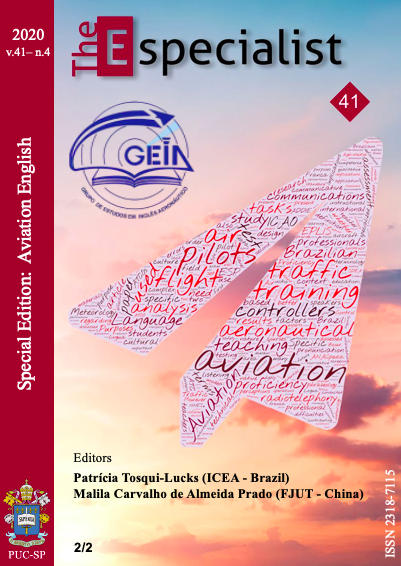A brief analysis of language tasks used by air traffic controllers in radiotelephony communications in Brazil
DOI:
https://doi.org/10.23925/2318-7115.2020v41i4a5Keywords:
, Aviation English, Aeronautical English, Air Traffic Controllers, EPLIS, Language Tasks.Abstract
This article reports the results of a study, conducted by the EPLIS (the SISCEAB Aeronautical English Language Proficiency Exam) development team, which consisted, among other things, of an analysis followed by discussion of the language tasks listed in Appendix B of the Manual on the Implementation of Language Proficiency Requirements (Doc 9835, ICAO, 2010). Although those language tasks supposedly represented language used by air traffic controllers, they were considered too vague to be used to improve the exam or to develop teaching and assessment materials. The study was carried out by a team of five experienced and proficient air traffic controllers from different facilities and a language expert with experience in teaching and assessing English for specific purposes using a focus group methodology. The results have shown that the most frequently used language tasks are related to traffic management, mostly covered by phraseology. On the other hand, language tasks involving explanation and clarifications, which are highly recurrent in radiotelephony communications, require the use of plain language. Additionally, the analysis has revealed that although some language tasks might not be so complex in terms of language, nor so frequently used, they play an important role in the safety of operation.
References
ALDERSON, J. C. 2009. Air safety, language assessment policy, and policy implementation: the case of aviation English. Annual Review of Applied Linguistics 29, 168–187.
ARAGÃO, B. F. 2020. Critérios autóctones como subsídios para a revisão da escala de proficiência utilizada no contexto aeronáutico. Master´s Dissertation, Instituto de Estudos da Linguagem, Universidade Estadual de Campinas.
GARCIA, A. C. M. 2015. What do ICAO language proficiency test developers and raters have to say about the ICAO language proficiency requirements 12 years after their publication? A qualitative study exploring experienced professionals’ opinions. Master´s Dissertation, Lancaster University.
INTERNATIONAL CIVIL AVIATION ORGANIZATION/ICAO. 2004. Doc. 9835 AN/453: Manual on the implementation of ICAO language proficiency requirements. 1. ed. Montreal.
INTERNATIONAL CIVIL AVIATION ORGANIZATION/ICAO. 2009. Circular 323 AN/185: Guidelines for aviation English training programs. Montreal.
INTERNATIONAL CIVIL AVIATION ORGANIZATION/ICAO. 2010. Doc. 9835 AN/453: Manual on the implementation of ICAO language proficiency requirements. 2. ed. Montreal.
KIM, H. 2012. Exploring the construct of aviation communication: a critique of the ICAO language proficiency policy. Doctoral Thesis, Arts, University of Melbourne.
KNOCH, U. 2009. Collaborating with ESP stakeholders in rating scale validation: the case of the ICAO rating scale. In: JOHNSON, J. S.; E. LAGERGREN (Ed.) Spaan fellow working papers in second or foreign language assessment. Washington, DC: University of Michigan, 7: 21-46.
KNOCH, U.; S. MACQUEEN. 2020. Assessing English for Professional Purposes. New York: Routledge.
McNAMARA, T. 2000. Language Testing. Oxford University Press.
MESSICK, S. 1989. Validity. In: LINN R. L. (Ed.), The American Council on Education/Macmillan series on higher education. Educational measurement, Macmillan Publishing Co, Inc; American Council on Education, p. 13–103.
___________. 1996. Validity and washback in language testing. Language Testing, 13.3: 241-255.
MONTEIRO, A. L. T. 2009. Comunicações entre pilotos e controladores de voo: fatores linguísticos, discursivo-interacionais e interculturais. Master´s Dissertation – Faculdade de Letras, Universidade Federal do Rio de Janeiro.
PRADO, M. 2015. Levantamento dos padrões léxico-gramaticais do inglês para aviação: um estudo vetorado pela Linguística de Corpus. Master´s Dissertation – Faculdade de Filosofia, Letras e Ciências Humanas, Universidade de São Paulo, São Paulo.
SCARAMUCCI, M. V. R. 2004. Efeito retroativo da avaliação no ensino-aprendizagem de línguas: o estado da arte. Trabalhos em Linguística Aplicada, 43.1: 203-26.
______________________. 2009. Avaliação da leitura em inglês como língua estrangeira e validade de construto. Calidoscópio 7.1: 30-48.
______________________. 2011.Validade e consequências sociais das avaliações em contextos de ensino de línguas. Linguarum Arena, 2: 103-120.
SCARAMUCCI, M. V. R.; et al. 2010.Validação do exame de proficiência em língua inglesa para profissionais prestadores de serviços de tráfego aéreo do SISCEAB. Campinas: Unicamp.
SCARAMUCCI, M.V.R.; P. TOSQUI-LUCKS; S.M. DAMIÃO (Ed.). 2018. Pesquisas sobre inglês aeronáutico no Brasil. Campinas: Pontes Editores.
SILVA, A. L. B. C. 2016. Uma Análise de Necessidades de Uso da Língua Inglesa por Oficiais Aviadores do Esquadrão de Demonstração Aérea da Força Aérea Brasileira. Master´s Dissertation – Instituto de Estudos da Linguagem, Universidade Estadual de Campinas, Campinas.
SOUZA, P. R. 2018a. O efeito retroativo do EPLIS nas percepções, atitudes e ações de professores e alunos de um curso de formação em controle de tráfego aéreo. Doctoral Thesis, Instituto de Estudos da Linguagem, Universidade Estadual de Campinas.
____________. 2018b. Os componentes determinantes do efeito retroativo de um exame de proficiência em inglês aeronáutico. In: SCARAMUCCI, M.V.R.; P. TOSQUI-LUCKS; S.M. DAMIÃO (Ed.). Pesquisas sobre inglês aeronáutico no Brasil. Campinas: Pontes. p. 221-242.
TOSQUI-LUCKS, P.; A. L. B. C SILVA. This volume. Aeronautical English: Investigating the nature of this specific language in search of new heights.
Downloads
Published
How to Cite
Issue
Section
License
The authors grant the journal all copyrights relating to the published works. The concepts issued in signed articles are the absolute and exclusive responsibility of their authors.


 Esta obra está licenciada com uma Licença
Esta obra está licenciada com uma Licença 